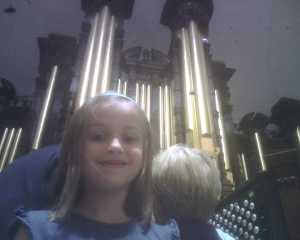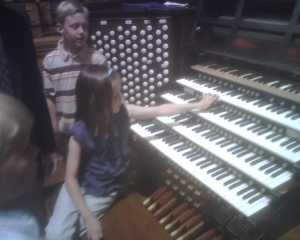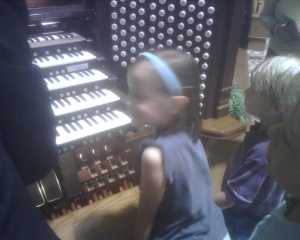On July 3 my oldest daughter and I were fortunate enough to attend our Uncle Jim’s organ concert in the Salt Lake Tabernacle. We were in Salt Lake City for a family funeral but the Fourth of July atmosphere and its expression in the organ concert lifted our spirits as we enjoyed a fantastic performance of a variety of celebrations of America in music in what is, for us, a special place.
 We enjoyed not only classic American songs traditional for the Fourth of July but also traditional American hymns of devotion and faith, including Come Thou Fount of Every Blessing and Amazing Grace (and others), all of which were resplendant on the Tabernacle organ. Our Aunt Barb, Jim’s sister, also sang America the Beautiful with Jim accompanying on the organ as part of the concert. While listening to this and the other patriotic songs booming from the powerful Tabernacle organ, as well as the American devotional songs, my mind turned to our pioneer heritage and the upcoming July 24 celebrations, even though we were on the eve of the Fourth of July.
We enjoyed not only classic American songs traditional for the Fourth of July but also traditional American hymns of devotion and faith, including Come Thou Fount of Every Blessing and Amazing Grace (and others), all of which were resplendant on the Tabernacle organ. Our Aunt Barb, Jim’s sister, also sang America the Beautiful with Jim accompanying on the organ as part of the concert. While listening to this and the other patriotic songs booming from the powerful Tabernacle organ, as well as the American devotional songs, my mind turned to our pioneer heritage and the upcoming July 24 celebrations, even though we were on the eve of the Fourth of July.

Giving it a try: up close and personal with the famous Tabernacle organ
The Fourth of July and Pioneer Day, July 24, really go hand in hand as holidays of the same stripe. Despite having been ousted from the boundaries of the United States of America in the largest forced migration in American history, our Latter-day Saint ancestors made a point of celebrating the Fourth of July as “loyal Americans” (even though a great number of them had recently emigrated from England and elsewhere, “across the sprung longitudes of the mind”) from almost the very beginning after settling in the remote wilderness of the valley of the Great Salt Lake in 1847. It is a solemn thing to ponder the feet of those who made the trek, whether those who sacrificed by burying children along the way in the vanguard company or who did so later in the successive waves of Mormon and other pioneers who made the incredible journey across America’s wildernesses.
Pioneer Day is, simply, an expression of gratitude that our ancestors arrived in a place far away from the severe persecutions and suffering at the hands of fellow citizens and neighbors that they experienced in Nauvoo and in Missouri before that. The Fourth of July is a reminder that such persecutions and suffering should not have occurred in the first place in a land that exalts individual freedoms. It took a Civil War — not fought for religious freedom but with immediate effects for the personhood and freedom of those incomprehensibly enslaved on American soil because of their race — for the Bill of Rights to begin being incorporated against the states so that, as a derivative blessing of that emancipating struggle, the First Amendment could become the robust protection of religious freedom and liberty of conscience, for both religious and non-religious people, that it became throughout the twentieth century.
Appreciating both holidays together as I sat in the Tabernacle listening to both classical patriotic and devotional Americana, I felt deeply grateful for the protective hand of Providence in our daily lives, in the course of the Church, in the progress of our country, and in the blessings that abound in our current country of residence, the United Kingdom, whose history, culture, political system and philosophies and countrymen so profoundly influenced the rise of my own native homeland in the United States of America.
 On this Pioneer Day my prayer is that we, as Latter-day Saints who are U.S. citizens, may always remember the need for a robust First Amendment and always engage ourselves in its protection. May Latter-day Saints in other countries and societies always raise their voices in favor of such protections of freedom of conscience and religious expression and devotion, whether under the European Convention on Human Rights or the individual constitutions of nations around the world. Above all, may we American Latter-day Saints give pause before joining forces with elements that would hope to weaken the separation of church and state that has been established in our inspired political system and which protects us in our freedom to worship as we please from the aims of those of other religions or of no religion who are not favorably disposed towards Mormons and who would expressly prefer the Church to cease its very existence or who would desire to greatly restrict our ability to practice our religion as our conscience dictates. May we always be free to rejoice, as my daughter in the picture above, in the sight of the Tabernacle organ and what that represents for us as Latter-day Saints.
On this Pioneer Day my prayer is that we, as Latter-day Saints who are U.S. citizens, may always remember the need for a robust First Amendment and always engage ourselves in its protection. May Latter-day Saints in other countries and societies always raise their voices in favor of such protections of freedom of conscience and religious expression and devotion, whether under the European Convention on Human Rights or the individual constitutions of nations around the world. Above all, may we American Latter-day Saints give pause before joining forces with elements that would hope to weaken the separation of church and state that has been established in our inspired political system and which protects us in our freedom to worship as we please from the aims of those of other religions or of no religion who are not favorably disposed towards Mormons and who would expressly prefer the Church to cease its very existence or who would desire to greatly restrict our ability to practice our religion as our conscience dictates. May we always be free to rejoice, as my daughter in the picture above, in the sight of the Tabernacle organ and what that represents for us as Latter-day Saints.

Continue reading at the original source →



